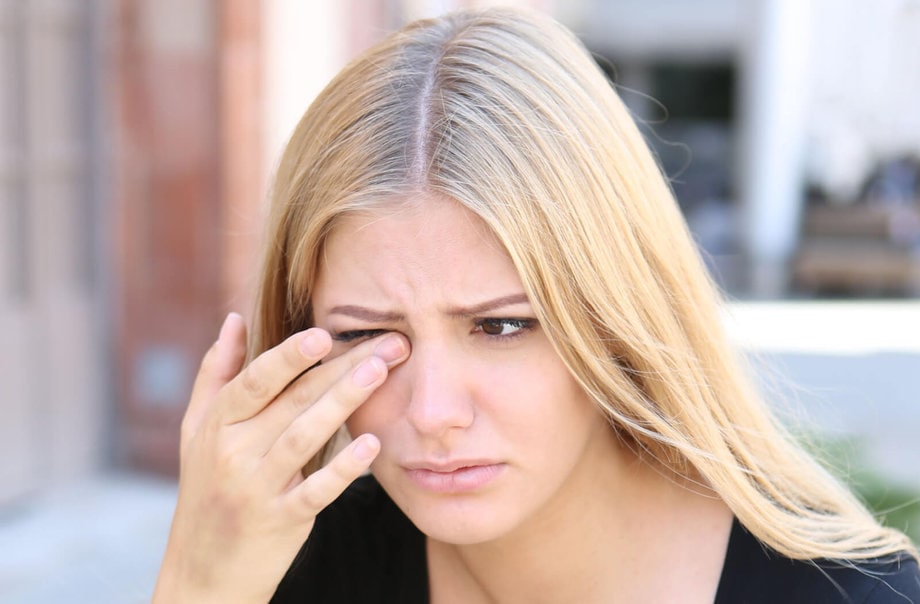Can Excessive Rubbing Harm Your Eyes

This article examines the potential harm caused by excessive rubbing of the eyes.
It explores the vulnerability of the eye’s anatomy and the common eye conditions that can be exacerbated by rubbing.
Additionally, the link between rubbing and increased eye pressure is explored.
The article also provides strategies for soothing itchy eyes without resorting to rubbing and highlights when it is necessary to seek professional help for eye discomfort.
Key Takeaways
- Excessive rubbing can cause corneal abrasions, leading to pain, redness, and blurred vision.
- Rubbing can disrupt the tear film, leading to dry eyes and increased risk of infections.
- Psychological factors like stress and anxiety can increase the likelihood of eye rubbing.
- Excessive rubbing can lead to negative consequences, such as corneal abrasions and infections.
The Anatomy of the Eye and Its Vulnerability
The vulnerability of the eye’s anatomy can be observed when excessive rubbing occurs. The eye is a complex organ composed of various delicate structures that work together to provide vision.
The cornea, for instance, is a transparent, outermost layer that acts as a protective barrier against foreign particles and provides most of the eye’s focusing power. Excessive rubbing can cause corneal abrasions, leading to pain, redness, and blurred vision.
Moreover, rubbing the eyes can also disrupt the tear film, which is responsible for lubricating and nourishing the eye’s surface. This can result in dry eyes and increased susceptibility to infections.
Therefore, maintaining proper eye health and care, such as avoiding excessive rubbing, is crucial to prevent potential damage to the eye’s anatomy and overall well-being.
Understanding the Urge to Rub Your Eyes
Understanding the urge to engage in ocular manipulation can provide insights into the potential consequences of this behavior.
Eye rubbing and sleepiness have been found to be closely related, with individuals often experiencing an increased urge to rub their eyes when they are feeling tired or drowsy. This association suggests that eye rubbing may serve as a natural response to alleviate discomfort or fatigue in the eyes.
Additionally, psychological factors have been found to influence eye rubbing behavior. For example, stress and anxiety have been shown to increase the likelihood of engaging in this behavior. Furthermore, individuals who have a habit of rubbing their eyes may find temporary relief from symptoms such as itchiness or dryness.
However, it is important to note that excessive or forceful eye rubbing can potentially lead to various negative consequences, including corneal abrasions, eye infections, and worsening of pre-existing eye conditions.
Potential Harm Caused by Excessive Rubbing
Potential negative outcomes can result from the excessive manipulation of the ocular region. Understanding eye irritation and the prevention of eye rubbing are essential in maintaining good ocular health. Excessive rubbing can lead to various harmful effects on the eyes, including:
- Corneal abrasion: Frequent rubbing can cause scratches on the cornea, the transparent outer layer of the eye. This can result in discomfort, pain, and potential vision loss.
- Infection: Rubbing the eyes with dirty hands can introduce harmful bacteria or viruses, leading to eye infections such as conjunctivitis. These infections can cause redness, discharge, and blurry vision.
- Progression of underlying conditions: Excessive rubbing can worsen certain eye conditions, such as dry eye syndrome or allergic conjunctivitis. It can exacerbate symptoms like itching, redness, and irritation.
To prevent these potential harms, it is crucial to resist the urge to rub the eyes and seek proper treatment for underlying eye conditions.
Common Eye Conditions Exacerbated by Rubbing
Rubbing the eyes can lead to corneal abrasions, which are scratches on the surface of the cornea. These abrasions can cause pain, redness, and a gritty sensation in the eye.
Additionally, rubbing can worsen dry eye symptoms by disrupting the natural tear film and causing further irritation.
Furthermore, individuals with allergies may experience an exacerbation of their symptoms when they rub their eyes, as rubbing can release more allergens into the eye and trigger an allergic reaction.
Corneal Abrasions From Rubbing
Corneal abrasions can occur as a result of excessive mechanical friction on the surface of the eye. These injuries can cause pain, redness, tearing, and sensitivity to light.
To prevent corneal abrasions and ensure proper eye care, the following measures are recommended:
- Avoid rubbing the eyes vigorously: Excessive rubbing can increase the risk of corneal abrasions by causing direct trauma to the delicate corneal tissue.
- Use protective eyewear: When engaging in activities that may pose a risk to the eyes, such as sports or construction work, wearing appropriate protective eyewear can help prevent corneal injuries.
- Practice good hygiene: Regularly washing hands and avoiding touching the eyes with dirty hands can reduce the likelihood of introducing harmful substances or bacteria that may lead to corneal abrasions.
Dry Eye Worsened by Rubbing
Dry eye symptoms can be exacerbated by the act of vigorously rubbing the eyes, further irritating the ocular surface and potentially worsening the condition. Rubbing the eyes can disrupt the tear film, leading to increased evaporation and reduced lubrication of the ocular surface. This can result in symptoms such as dryness, redness, itching, and blurred vision. To alleviate dry eye symptoms, various treatment options are available. One common approach is the use of artificial tears or lubricating eye drops. These eye drops can help to replenish the tear film and provide temporary relief from dryness and discomfort. Other treatment options may include prescription medications, such as anti-inflammatory drugs or immunomodulators, and in some cases, procedures like punctal plugs or meibomian gland expression. It is important to consult with an eye care professional to determine the most appropriate treatment for individual cases of dry eye.
| Treatment Options | Description |
|---|---|
| Artificial Tears | Lubricating eye drops that help replenish the tear film and provide temporary relief from dryness and discomfort. |
| Prescription Medications | May include anti-inflammatory drugs or immunomodulators to reduce inflammation and manage underlying causes of dry eye. |
| Procedures | Punctal plugs or meibomian gland expression may be used to enhance tear retention or improve meibomian gland function. |
Allergic Reactions and Rubbing
Allergic reactions can contribute to the exacerbation of symptoms related to ocular surface irritation. When it comes to eye irritation, allergic reactions can have a significant impact. Here are three ways in which allergic reactions can worsen eye irritation:
- Redness and Itching: Allergic reactions can lead to redness and itching of the eyes, causing discomfort and further irritation.
- Swelling and Watering: Allergens can trigger an inflammatory response in the eyes, resulting in swelling and excessive tearing.
- Sensitivity to Light: Allergic reactions can make the eyes more sensitive to light, leading to increased discomfort and irritation.
Understanding the role of allergic reactions in eye irritation is crucial for effective management and treatment. Identifying and avoiding allergens, along with appropriate medical interventions, can help alleviate symptoms and improve overall eye health.
The Link Between Rubbing and Increased Eye Pressure
Eye rubbing has been found to have a potential link to the development and progression of glaucoma, a chronic eye condition characterized by high intraocular pressure and damage to the optic nerve. Several studies have suggested that the mechanical pressure applied to the eye during rubbing can increase intraocular pressure, which in turn may contribute to the development or worsening of glaucoma.
Furthermore, repeated and forceful rubbing of the eyes can cause damage to the cornea, retina, and other structures of the eye, leading to vision impairment or loss.
Eye Rubbing and Glaucoma
Rubbing the eyes excessively has been associated with an increased risk of developing glaucoma. Glaucoma is a group of eye conditions that can cause damage to the optic nerve, leading to vision loss. While the exact relationship between eye rubbing and glaucoma is not fully understood, several factors contribute to this association.
Here are three reasons why excessive eye rubbing may be harmful:
- Increased eye pressure: Rubbing the eyes can temporarily increase intraocular pressure, which is a known risk factor for glaucoma development.
- Disruption of blood flow: Vigorous eye rubbing can disrupt normal blood flow to the eyes, potentially damaging the optic nerve and increasing the risk of glaucoma.
- Structural damage: Repetitive eye rubbing can lead to the breakdown of collagen and elastin fibers in the skin around the eyes, contributing to the development of wrinkles.
It is essential to be mindful of our eye rubbing habits to minimize the potential risks associated with glaucoma and other eye conditions.
Rubbing Causing Vision Damage
Mechanical pressure applied to the delicate tissues surrounding the ocular region can result in structural damage and potentially lead to vision impairment. In the context of vision health and eye care, excessive rubbing of the eyes is a common behavior that can have detrimental effects on the eyes.
Rubbing the eyes forcefully can cause the fragile blood vessels in the conjunctiva to rupture, leading to subconjunctival hemorrhage. Additionally, the repetitive motion of rubbing can strain the muscles responsible for focusing the eyes, potentially resulting in blurred vision or difficulty in focusing.
Moreover, excessive rubbing can also exacerbate existing eye conditions such as dry eye syndrome or allergic conjunctivitis. Therefore, it is crucial to exercise caution and seek appropriate eye care measures to maintain optimal vision health.
Strategies to Soothe Itchy Eyes Without Rubbing
One recommended approach to alleviate itchiness in the eyes without resorting to rubbing or other mechanical actions involves implementing various soothing strategies. These strategies, which are often used as natural remedies, can provide relief and promote overall eye health.
- Cold compress: Applying a cold compress to the eyes can help reduce inflammation and soothe itching. This can be done by placing a clean washcloth soaked in cold water over the eyes for a few minutes.
- Artificial tears: Eye drops containing lubricating ingredients can help moisturize the eyes and provide temporary relief from itchiness. These drops can be used as needed throughout the day.
- Allergen avoidance: Identifying and avoiding potential allergens, such as pollen or pet dander, can help prevent eye irritation and itchiness. This may involve keeping windows closed, using air purifiers, or avoiding certain foods or environments.
When to Seek Professional Help for Eye Discomfort
Seeking professional help for eye discomfort is advisable when symptoms persist despite implementing various soothing strategies and when there is concern about the underlying cause of the discomfort.
While home remedies can provide temporary relief for mild eye discomfort, they may not be effective in addressing more serious underlying issues.
If the discomfort persists or worsens despite trying home remedies such as warm compresses, over-the-counter eye drops, or avoiding potential irritants, it is important to consult a healthcare professional.
They can provide a thorough examination of the eyes, identify any underlying conditions, and recommend appropriate medical interventions.
Seeking medical advice is especially crucial if there are additional symptoms present, such as blurred vision, redness, discharge, or pain.
Prompt evaluation and treatment can help prevent potential complications and ensure optimal eye health.
Frequently Asked Questions
Can Excessive Rubbing of the Eyes Lead to Permanent Damage?
Excessive rubbing of the eyes can potentially lead to permanent damage. Eye massage techniques for relieving eye strain may result in relief, while the connection between eye rubbing and contact lens discomfort warrants further investigation.
How Can Rubbing the Eyes Worsen Existing Eye Conditions?
Excessive rubbing of the eyes can exacerbate existing eye conditions by causing further irritation and inflammation. It is essential to address the root causes of eye irritation and practice proper eye care to maintain good vision.
Is It Normal to Experience Increased Eye Pressure After Rubbing?
Increased eye pressure is a potential consequence of rubbing the eyes. This action can have detrimental effects on eye health, contributing to the development or worsening of existing eye conditions.
Are There Any Alternative Methods to Relieve Itchy Eyes Without Rubbing?
Natural remedies, such as cold compresses or cucumber slices, can provide relief for itchy eyes without the need for excessive rubbing. Additionally, over-the-counter eye drops may help to alleviate symptoms and reduce the urge to rub the eyes.
When Should I Consult a Healthcare Professional for Eye Discomfort?
Consultation timing for eye discomfort depends on the severity. If symptoms persist or worsen, it is advisable to seek a healthcare professional’s opinion. They can provide appropriate diagnosis, treatment, and guidance for optimal eye health.









